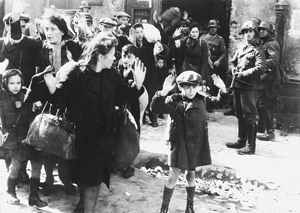
Source: Stroop Report - Warsaw Ghetto Uprising BW, Wikimedia
An author can also choose to influence the plot of a story through theme (the central or universal idea of a piece of fiction). Themes in literature help connect readers, as human beings, to the universal elements of life. Some themes you might find in literature include love conquers all (Shakespeare’s Romeo and Juliet), good vs. evil (Elie Wiesel’s Night), and war (Stephen Crane’s The Red Badge of Courage).
One particularly powerful example of this connection between themes in literature and the universal elements of life is the heartfelt writings of a young 13-year-old Dutch girl named Anne Frank. Although her book, The Diary of Anne Frank, captures the actual day-to-day events in her life, like a work of fiction, it has a setting and plot that are connected to the characters of the story. The severe setting of her hiding place—the cramped quarters of an Amsterdam apartment housing during the Nazi Holocaust of World War II—directly affects the character’s thoughts and actions as well as the plot.
 Below is an excerpt from Anne Frank’s stirring, first-hand account of her difficult experience hiding from the Nazis during World War II. Read through the selection and then use your notes to jot down some of the ways the author makes connections between the setting and the theme of courage. Be on the lookout for ways the main character changes as a result of her setting.
Below is an excerpt from Anne Frank’s stirring, first-hand account of her difficult experience hiding from the Nazis during World War II. Read through the selection and then use your notes to jot down some of the ways the author makes connections between the setting and the theme of courage. Be on the lookout for ways the main character changes as a result of her setting. After you have jotted down notes, go back and click on the highlighted text to see some thoughts on how the author makes those connections between the setting of her story (a cramped apartment in Nazi-occupied Amsterdam) and one of the themes of the story: courage.

As you can see, a writer’s decisions about setting have important consequences for the characters, the plot, and even the theme. As a writer, you’ll want to think deeply about setting as you begin to write your next story.